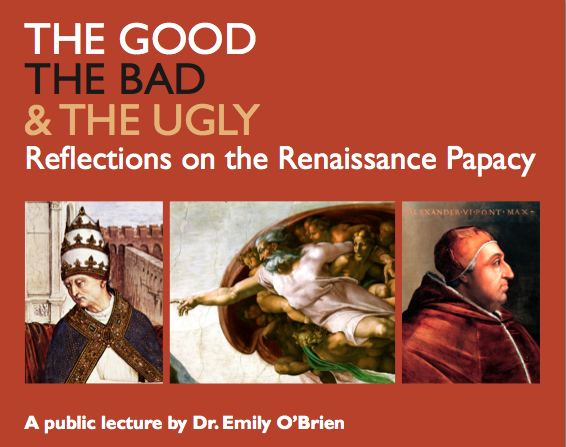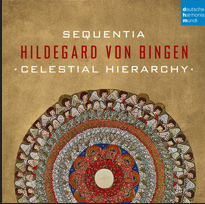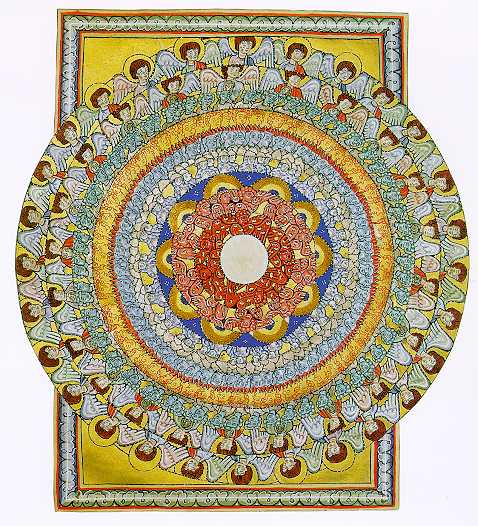Design: Emanuela Guerra (FHIS’s in-house design whizz).
This information has also been added to the original post about Raúl’s talk (on 24 January).
Poster in PDF: please distribute and print as desired!
Design: Emanuela Guerra (FHIS’s in-house design whizz).
This information has also been added to the original post about Raúl’s talk (on 24 January).
Poster in PDF: please distribute and print as desired!

Please join the SFU Department of History on January 23rd for the fourth installment of our public lecture series, Heroes & Villains: Rethinking Good and Evil in History.
The Good, the Bad, and the Ugly: Reflections on the Renaissance Papacy
A public lecture presented by Dr. Emily O’Brien
January 23, 2014 | 5:30 PM
Fletcher Challenge Theatre, Harbour Centre
515 W. Hastings St., Vancouver, BC
In popular culture, the Renaissance papacy (c. 1417-1534) seems an intriguing mixture of highs and lows. On the one hand, it dazzles us with artistic achievements – the Sistine Chapel and St. Peter’s, to name but two. On the other, it shocks us with personalities infamous enough to thrive on cable television (“The Borgias,” anyone?). While this blend of extremes may draw us to the Renaissance papacy, how much can it actually teach us? A great deal, in fact. This lecture tours the good, the bad and the ugly of this period in papal history and, in so doing, illuminates how this era represented a turning point for the Western Church.
This event is free and open to the public. Seating is limited, and registration is strongly encouraged. Reserve your spot online: http://www.sfu.ca/history/events/papacy.html.
Unable to attend? Check out all of our public lectures on our YouTube channel: https://www.youtube.com/channel/UCjovwYJ237SlP75IFJ-yVKQ/videos.
The UBC Theatre and Film Program’s research seminar presents a talk by guest speaker
CHANTAL PHAN (Dept of French, Hispanic and Italian Studies, and Medieval Studies Program).
Title: “TEXT AND MUSIC IN THE LITURGICAL DRAMA OF MEDIEVAL FRANCE”
Abstract:
Like its European counterparts, French liturgical drama combines Gregorian chant and secular melodies, history and fiction, life lessons and comedic action. Stemming, in the 11th century, from a simple dialogue in the sung Latin liturgy of Easter, this form of drama remained closely linked with the Christian feast days, but grew into full-fledged plays, incorporating newly composed songs, borrowings from the troubadour and trouvère love lyric, sections in the vernacular languages, and new characters.
Examples in this presentation will be taken from works that Chantal Phan has had opportunities to approach as a philologist, specialist of medieval literature, performer, singers’ coach, and musicologist:
They are an Epiphany play, “Tractus stellae” (12th c.), the Easter play, “Ludus paschalis” (11th-13th c.), and the Play of St Agnes (14th c.). Aspects discussed will be: text-music structure, melodic borrowing, imitation and novelty, characterisation, and dramatic expression.
Chantal Phan is currently planning the 2015 joint UBC Medieval Workshop / Gregorian Institute of Canada Conference on liturgical drama.
…..
Tuesday, February 4th,
11:45-12:45
Room 112 in Frederic Wood Theatre.
Everyone is welcome.
Information:
Selena Couture
selena.couture@ubc.ca
The UBC EARLY ROMANCE STUDIES RESEARCH CLUSTER
presents
RAÚL ALVAREZ-MORENO (French, Hispanic and Italian Studies, UBC)
“CONTEXTUALIZING THE SPANISH IMPERIAL PROJECT IN RELATION TO THE ORIENT:
THE LEGATIO BABYLONICA (1501) BY PETER MARTYR D´ANGHIERA, AN ANNOTATED TRILINGUAL EDITION BASED ON THE 1516 VERSION OF THE TEXT”
The Legatio Babylonica, written in Latin in 1501 by humanist Peter Martyr d’Anghiera, is a relazione or description of the author’s diplomatic mission to Venice and Egypt that includes his personal views on Western and Islamic civilization. This presentation will provide an overview of Raúl Alvarez-Moreno’s recent edition and translation of the book (June 2013), focusing on the relevance of the text and on some of the main contributions of the research project.
Buchanan Tower, 1873 East Mall, room 826
Friday, January 24th at 3:00 pm
All are welcome.
Poster (PDF)
Info: chantal.phan@ubc.ca

Wednesday evening, 22 January 2014 at 8:00 pm
Pre-concert chat with host Matthew White at 7:15 pm
PLEASE NOTE VENUE: Holy Rosary Cathedral, 646 Richards at Dunsmuir, downtown Vancouver
[directions]
presents
Sequentia:
Mystical Voices of Mediæval Germany
Hildegard von Bingen (1098-1179): Celestial Hierarchy
SEQUENTIA ENSEMBLE FOR MEDIÆVAL MUSIC:
Benjamin Bagby director, harp
Norbert Rodenkirchen flutes & harp
SEQUENTIA WOMEN’S VOCAL ENSEMBLE:
Agnethe Christensen, Lydia Heather Knutson, Esther Labourdette, Sabine Lutzenberger, Christine Mothes, Elodie Mourot, Lena Susanne Norin
In the World Premiere of this new progamme, Sequentia presents a selection of the most innovative and expressive vocal music of the High Middle Ages in Germany, featuring masterpieces of the 12th-century Benedictine visionary and composer Hildegard von Bingen.
Full details—ticket prices and ordering information, programme, programme notes, musicians’ biographies—at Early Music Vancouver.
 Green College Society Series: Interdisciplinarity in Action
Green College Society Series: Interdisciplinarity in Action
Guest speaker: BENJAMIN BAGBY (Ensemble Sequentia, Paris)
“Hildegard von Bingen and the German Mystical Tradition in Medieval Music”
Coach House, Green College, 6201 Cecil Green Park Road, UBC
Tuesday, January 21, 5-6:30 pm, reception to follow, all welcome
Benjamin Bagby, leading medieval scholar and internationally recognized performer, discusses the creation of Ensemble Sequentia‘s newest program featuring masterpieces of the Benedictine visionary and composer Hildegard von Bingen (12th century) in the wider context of the German mystical tradition.
Hildegard von Bingen was many things – a mediæval Benedictine abbess and mystic from the Rhineland, recently made a saint and doctor ecclesiæ; a renowned healer and natural scientist; a passionate witness to the power of divinity as manifested in countless visions of extraordinary vividness; a modern ‘new-age’ and feminist icon who inspired countless books, performances, and even a recent German film; a woman of noble birth and immense courage, who was not intimidated by the male hierarchy of the 12th century church, who fought for the rights of her convent, and corresponded freely with prelates, kings, queens and emperors. But most surprisingly, this unique mediæval personality is known as a brilliant Latin poet and musician, the creator of over 75 virtuosic spiritual songs of astonishing originality and beauty as well as the earliest surviving music-drama written by a known composer.
Vocalist, harper and mediævalist Benjamin Bagby has been an important figure in the field of mediæval musical performance for over 30 years. Born near Chicago, he studied at Oberlin Conservatory and the Schola Cantorum Basiliensis, where Sequentia was founded in 1977. Since then he has been devoted to the research, performance and recording work of Sequentia. Benjamin is also deeply involved with the solo performance of Anglo-Saxon and Germanic oral poetry; his acclaimed performance of the Beowulf epic continues to be heard worldwide and was released as a DVD in 2007. In 2010 he received the Howard Mayer Brown Lifetime Achievement Award from Early Music America. In addition to researching and creating over 70 programmes for Sequentia, Benjamin has published widely, writing about mediæval performance practice; as a guest lecturer and professor, he has taught courses and workshops all over Europe and North America. Since 2005 he is an associate professor at the Sorbonne, University of Paris, where he teaches mediæval music performance practice.
See also:
The final CD of Sequentia’s Hildegard von Bingen complete works project was recorded for SONY in November 2012, and released in 2013 as a single CD, to be followed by the complete works box set at a later date. The completion of this enormous project, begun by Sequentia in 1982, represents the culmination of the life’s work of the late Barbara Thornton and also celebrates Hildegard’s elevation to sainthood and magistra ecclesiae in 2012. A multi-generational ensemble of women’s voices plus the flautist Norbert Rodenkirchen was united under the direction of Benjamin Bagby for this unique recording.
 Download the call for papers (CFP)
Download the call for papers (CFP)
Call for Papers *extended deadline*: 1 February 2014
Workshop dates: 7-9 November 2014
The Œcologies Project, along with the Committee for Medieval Studies at the University of British Columbia, solicits contributors for the 42nd annual UBC workshop, to be held from 7-9 November 2014 at Green College, University of British Columbia, Vancouver.
Medieval and Renaissance Œcologies seeks to interrogate premodern understandings of the natural world and ecological thinking. A prevailing attitude within modern Western culture has imagined the natural world as “out there,” a distinct realm upon which humans import subjective meaning. More recently, ecocritics and theorists of the new materialism(s) have challenged this conception of nature. This workshop takes up these challenges by investigating the idea of “œcology,” an older and defamiliarizing spelling of the modern concept “ecology.” The spelling is retained in an effort to rethink “ecology” through the study of premodern natural history, taxonomy, hierarchy, and categorization, and to ask what conceptual or metaphorical resources might help us – as located moderns – reorient our perceptions about the premodern past and our present and future moments. In an effort to define complex terms such as “environment,” “landscape,” and “ecology,” we ask where do these terms come from? What came before them? What do they mean here and now? What did conceptions of Nature and “œcology” look like in the Medieval and Renaissance periods and how did different discourse communities define their meanings?
We welcome papers from any discipline, and especially encourage interdisciplinary approaches. Please send paper proposals, questions, and / or expressions of interest to:
Vin Nardizzi or Robert Rouse by 1 February 2014.
This conference is part of the ongoing multi-year research project Œcologies (oecologies.com), supported by the University of British Columbia and Simon Fraser University.
Some further details follow below; for more, see each individual link; for more Early Music Vancouver concerts, see their main calendar of events. Continue reading Early Music Vancouver: some concerts in early 2014
The video and programme handout, with thanks to the perfomers for giving permission to post the former, and to Chantal Phan for the latter. When watching the video, it is recommended that the viewer skip to around the 3 minute mark to get straight to the performance itself and thus avoid and evade the unnecessary clownish introduction.*
[wpvideo REhsdYWj]
“ROLLANT AND RENART”
A musical performance of Medieval French narrative texts
Wednesday, November 27, from 12:00 to 12:50
Meekison Arts Student Space, room D-140 — main floor of Buchanan Building wing D.
12:00 noon
………………………………………………………………………………………………………………………………………………..
In the Middle Ages, almost all narratives were sung. To experiment with this lively approach to literature and to the Old French language, Chantal Phan’s FREN 407 class, students from the School of Music, and medieval vielle specialist Pat Unruh will perform excerpts from the 11th-c. SONG OF ROLAND (epic poem) and the 12th-13th-c. ROMANCE OF RENART (a satirical animal narrative). The performance will also include other repertoire: French two and three-part motets, a Gregorian lament, and an instrumental dance. Instruments: bowed vielle, organetto, recorders and percussion.
Commentary in English, and English translations of all sung passages provided on the handout.
Performers: Maegen Andolfatto, Kevin Dickie, John Inglis, Colin Jones (soloist), Line Lavoie, Maria Marion, Chantal Phan, Angelique Po, Jennine Punzalan, Chloe Sargent, Pat Unruh.
Conception and musical arrangements: Chantal Phan, Pat Unruh
Camcorder operator: Dorian Simonneaux
Poster (attached): Jennine Punzalan
* O’Brien apologizes for her clownishness, poor posture, and the unfortunate presence of “grading-gut” from excessive time spent sitting down slouching over work. Occupational hazard combined with insufficient exercise of late. To be remedied by running with deer in the woods etc. We apologise for the unintended contributions from a drinks vending-machine’s automated cooling apparatus; complaints should be addressed to whichever part of UBC is responsible for dealing with Coca-Cola™.
The next Medieval Workshop: Medieval and Renaissance Oecologies
 Download the call for papers (CFP)
Download the call for papers (CFP)
Call for papers (CFP) deadline: 1 February 2014
Workshop dates: 7-9 November 2014
The Œcologies Project, along with the Committee for Medieval Studies at the University of British Columbia, solicits contributors for the 42nd annual UBC workshop, to be held from 7-9 November 2014 at Green College, University of British Columbia, Vancouver.
Medieval and Renaissance Œcologies seeks to interrogate premodern understandings of the natural world and ecological thinking. A prevailing attitude within modern Western culture has imagined the natural world as “out there,” a distinct realm upon which humans import subjective meaning. More recently, ecocritics and theorists of the new materialism(s) have challenged this conception of nature. This workshop takes up these challenges by investigating the idea of “œcology,” an older and defamiliarizing spelling of the modern concept “ecology.” The spelling is retained in an effort to rethink “ecology” through the study of premodern natural history, taxonomy, hierarchy, and categorization, and to ask what conceptual or metaphorical resources might help us – as located moderns – reorient our perceptions about the premodern past and our present and future moments. In an effort to define complex terms such as “environment,” “landscape,” and “ecology,” we ask where do these terms come from? What came before them? What do they mean here and now? What did conceptions of Nature and “œcology” look like in the Medieval and Renaissance periods and how did different discourse communities define their meanings?
We welcome papers from any discipline, and especially encourage interdisciplinary approaches. Please send paper proposals, questions, and / or expressions of interest to: Vin Nardizzi or Robert Rouse by 1 February 2014.

Oecologies: Inhabiting Premodern Worlds is a research cluster that gathers scholars from the humanities living and working along the North American Pacific coast to investigate the idea of “oecology,” an older spelling of the modern concept “ecology.” We retain this defamiliarizing spelling because our research asks how we might rethink “ecology” through the study of premodern natural history, taxonomy, hierarchy, and categorization. By exploring an array of discourses about “oecology,” our research asks what conceptual or metaphorical resources might help us – as located moderns – reorient our perceptions about the premodern past and our present and future moments. Among other matters, our research will discuss the relations among terms such as N/nature, landscape, ecology, economy, environment, and technology, and will ask how our regionally and temporally specific conceptions draw / differ from premodern inhabitations of the world.
Vin Nardizzi (Associate Professor, English, University of British Columbia) teaches Renaissance literature, ecocriticism, and queer and disability studies.
Tiffany Werth (Associate Professor, English, Simon Fraser University) teaches the English Reformations, romance in all its forms, and is currently researching early modern habits of taxonomy and all things mineral.
Patricia Badir (Professor, English, University of British Columbia) teaches Renaissance literature, and is currently working on playmaking and the perils of mimesis on Shakespeare’s stage.
Robert Rouse (Associate Professor, English, University of British Columbia) teaches Medieval literature. His research has been primarily concerned with medieval romance and culture.